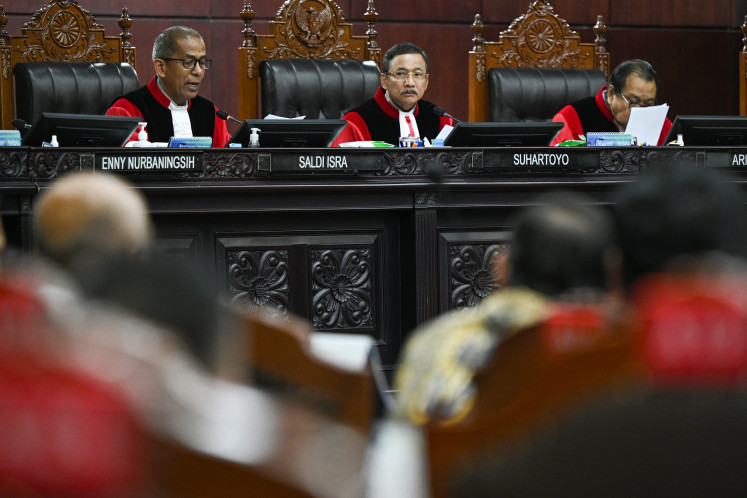Popular Reads
Top Results
Can't find what you're looking for?
View all search resultsPopular Reads
Top Results
Can't find what you're looking for?
View all search resultsEditorial: Prepared for the impact
The U
Change text size
Gift Premium Articles
to Anyone
The U.S. House of Representatives' approval of the US$700 billion in bailout funds for distressed financial institutions will ease things a little bit and prevent the panic in the financial market from escalating into a total crash, but the American economic recession will most likely remain with us for at least one or two years.
It is a comfort to know, therefore, that even though our financial industry is not widely, or directly, exposed to the U.S. financial crisis, our government has been closely monitoring and analyzing the fiasco and is preparing contingency measures to deal with any impact.
Indonesian fiscal and monetary authorities have constantly been in communication with each other, even during the Idul Fitri holidays last week, converging their perceptions of future problems and cooperating and coordinating in the design of additional measures to be put in place.
Economics ministers and leaders of Bank Indonesia met for several hours Sunday and again gathered at a plenary Cabinet session Monday to prepare, in cooperation with business leaders and analysts, a package of concerted action items in anticipation of the impact of the United States' worst financial crisis in five decades.
The immediate impact of the U.S. crisis is what Bank Indonesia Governor Boediono termed Sunday a global liquidity squeeze, affecting portfolio capital inflows to our capital and money markets.
The stock market jitters from London to Tokyo to Shanghai, Hong Kong and Singapore, and traders' growing anxiety over the impact of the U.S recession during the past few weeks, show how Asian growth is very much linked to, indeed dependent upon, the rest of the developed world, notably the United States and Europe.
The reverse flow of foreign hot (short-term) money from our financial market caused the Indonesian stock exchange index to fall to as low as 1,640 Monday, from its peak of more than 2,740 early this year. The market, we think, is still seeking a new equilibrium, a more sustainable market sentiment.
Likewise, our foreign reserves, currently estimated at more than US$58 billion (about five months of imports), also reflect a more stable fund because hot money flew out as foreign investors become more risk averse after the financial panic in the United States.
It is also fortunate that due to higher-than-estimated tax receipts, thanks mainly to the booming prices in natural resources such as palm oil, minerals, rubber and cacao, and a smaller-than-planned budget deficit, the government will not have to borrow much more from the commercial market, which now charges punitively high interest rates.
Certainly, the U.S. recession is also adversely affecting Europe, one of our major trading partners, and our largest trading partners in Asia such as Japan, China, South Korea and Singapore. Hence, we will also feel the blow on our international trade (exports) as a second-round knock-on effect. The Asian Development Bank estimates that more than 61 percent of total Asian exports are eventually consumed in the United States, Japan and Europe.
We're glad to know that our economics ministers, notably Trade Minister Mari Elka Pangestu, are fully aware of this risk and are designing additional measures to diversify export markets and strengthen our export competitiveness. It is also helpful that our best-performing exports over the past two years have been natural-resource commodities, whose demand is not highly volatile.
Our financial sector, notably the banking industry, is now much stronger than that before our 1997 financial crisis. Their capital base is broad with capital adequacy ratio averaging 16 percent and bad credit amounting only to less than 4 percent. Most important, the standard of good governance at banks and the quality of Bank Indonesia's bank supervision is now much higher.
Bank Indonesia Governor Boediono said Sunday he had been closely monitoring the rate of credit expansion and will take whatever measures in his power to maintain adequate liquidity in the market in such a way so as not to fuel inflationary pressures.
Coordinating Minister of the Economy/Finance Minister Sri Mulyani Indrawati assured the market that the fiscal authorities also were expediting budget disbursement for economic pump priming, further adding liquidity to the market to lubricate economic activities. Budget realization as of last month exceeded 51 percent, higher than the 45.4 percent in the same period last year, and is expected to reach 92 percent of the total by the year's end.
There is, though, another important factor -- the lesson from the U.S. financial crisis -- which is to safeguard confidence and trust in our own finance industry amid the current uncertainty in the global financial market.
The fiscal and monetary authorities should watch out for -- and straighten out immediately in a transparent manner -- any rumors that could undermine public confidence in our financial industry and set off a panic.
Because once a panic sets in, people -- investors, depositors, small savers -- are quick to generalize, punishing even sound institutions.
The best way to maintain confidence and trust is through effective regulations and supervision to force financial players to honor their promises and tell the truth.










